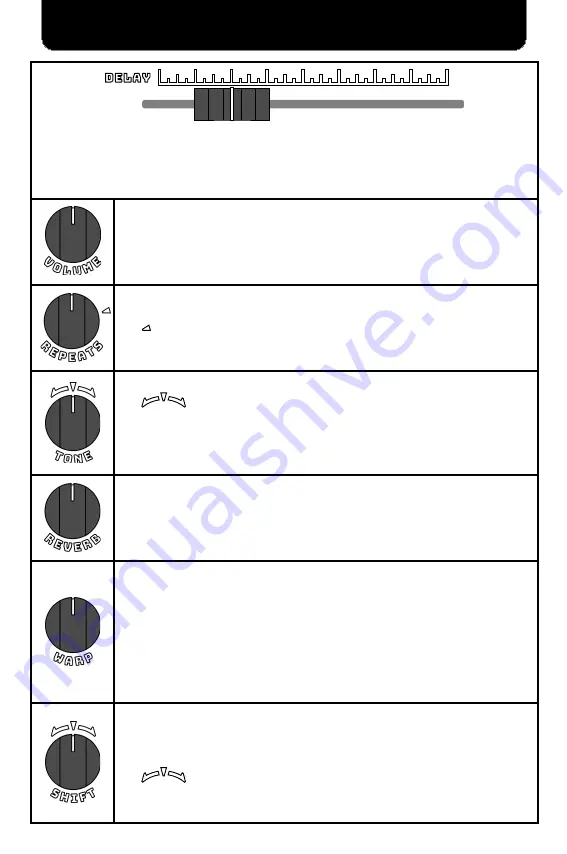
The
DELAY
slider controls the time between echoes, between a minimum of 50 milliseconds
at the far left, and a maximum of 2 seconds at the far right.
This control is motorized. Its position will automatically move when using the TAP Tempo
switch to set the delay, and also when presets are activated and change the delay time.
VOLUME
controls the output volume of the echoes. With the knob turned all
the way to the left, echoes will be silenced. With the knob turned all the way
to the right, the initial echo volume will be louder than the input volume.
NOTE: This does not affect the Reverb output volume. Reverb is controlled
independently with its own dedicated knob.
REPEATS
controls how much echoes will continue to repeat, fading more
quickly the more the knob is turned to the left.
The marker at about 2 O'Clock indicates the runaway feedback point, or
“self-oscillation point”. With the knob turned clockwise past this marker, the
repeating echoes will grow in volume rather than fade.
TONE
controls the Bass/Treble tone of the echoes.
The
marker indicates the center neutral point. With the knob
pointing straight up, the echo sound will be unchanged.
With the knob to the left of center, the echoes will sound warmer, with more
bass and less treble. With the knob to the right of center, the echoes will
sound brighter, with more treble and less bass.
REVERB
adds a reverberation effect, making the output sound like the
instrument is being played inside of an echoing chamber or large hall.
This effect is controlled separately from the echoes, and a reverb-only effect
is possible by turning up the
REVERB
while turning the
VOLUME
knob all
the way down.
WARP
controls how tape-like the sonic qualities of the echoes are.
With the knob turned all the way down to the left, echoes will sound clean
and pristine, able to repeat nearly endlessly without changing much.
With the knob between 9:00 and the midpoint, echoes will have the sonic
qualities of those produced by a well-tuned tape machine, with each new
echo blooming into a more “washed-out” sound.
With the knob up past the midpoint, the echoes will begin sounding as they
would sound coming from a tape machine in need of a tune-up, being more
wavering, fluttering, and gritty.
SHIFT
controls how much delay “shift” is applied when a note is played. This
unique effect mimics the user shifting the delay slider back and forth at the
same time that a note is played, causing the echoes to “shift” in pitch down
and back up, or up and back down, depending on the knob direction.
The
marker indicates the center neutral point where no shift occurs.
How far the knob is moved away from center determines how much the delay
is shifted left or right when a note is played.
Effect Control Knobs
6
Summary of Contents for EP-5
Page 1: ...Owners Manual...
Page 16: ...geckopedals com eck edal...


































